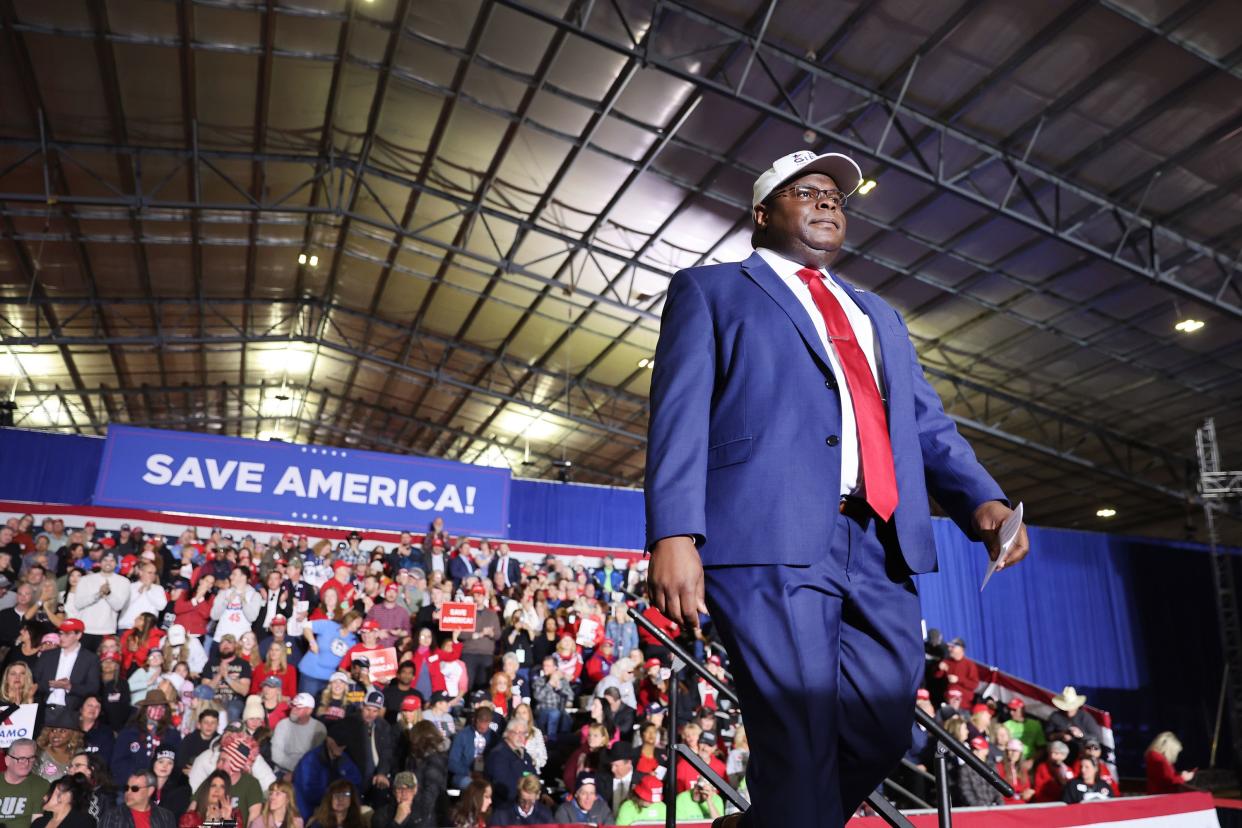Democrats Are Vindicated After Boosting Far-Right GOP Nominees

- Oops!Something went wrong.Please try again later.
(Bloomberg Government) -- The controversial strategy of spending millions during the primaries to boost far-right Republicans and election deniers paid off for Democrats with victories Tuesday in a half-dozen competitive races.
Most Read from Bloomberg
Sam Bankman-Fried’s $16 Billion Fortune Is Eviscerated in Days
US Inflation Slows More Than Forecast, Gives Fed Downshift Room
FTX Warns of Bankruptcy Without Rescue for $8 Billion Shortfall
Democratic groups had spent $36 million in 13 Republican primaries this year for ads to help elevate candidates they determined would be weaker opponents in the general election.
The tactics drew criticism in some corners, especially in a year when Democrats were defending narrow majorities and the support gave a boost to a candidate who refused to accept the 2020 election results or had ties to or support from President Donald Trump.
Contests where the tactic was vindicated included Michigan’s 3rd District, where Democrat Hillary Scholten toppled Republican John Gibbs, who’d served in the Trump administration.
The Democratic Congressional Campaign Committee spent nearly $450,000 on primary ads that tied Gibbs to his former boss and helped him beat Rep. Peter Meijer, one of 10 House Republicans who voted to impeach Trump following the Jan. 6 riot.
The ad buy in the Western Michigan district drew criticism from current and former Democrats. But the DCCC defended its strategy after Scholten’s win.
“We made a decision to remind people how extreme John Gibbs is and Republican primary voters made a choice,” DCCC spokesman Matt Corridoni said in a Wednesday statement.
Congressional Impacts
At the federal level, Democratic groups spent $8.5 million to influence the outcome of Republican primaries, according to Federal Election Commission filings. The spending represented a negligible amount for a midterm election cycle in which an estimated $8.9 billion was spent, according to OpenSecrets.
The interference didn’t always pay off. In four federal primaries—one Senate race and three House races—the Democrats’ preferred GOP candidate still lost.
But in New Hampshire, it helped Democratic Sen. Maggie Hassan by aiding the primary victory of Don Bolduc, a retired Army general who had vowed to restore Trump’s “America First” agenda, and who lost on Tuesday.
Bolduc made it onto the general election ballot after the Senate Majority PAC, a super PAC aligned with Democratic leadership, spent $3.1 million on primary ads attacking the favorite, State Sen. Chuck Morse, for connections to unnamed lobbyists for China and drugmakers.
The Democratic super PAC’s ad campaign dwarfed media buys by Bolduc, who spent just $33,760 on ads during his primary, according to AdImpact, which tracks political advertising.
Morse had the backing of a super PAC with ties to Republican Leader Mitch McConnell but still lost the nomination to Bolduc.
In New Hampshire’s 2nd Congressional District, Democrats Serve PAC spent $562,000 on primary ads attacking Republican Robert Burns for being an ultraconservative, pro-Trump candidate.
Burns spent less than $16,000 getting that message out to Granite State primary voters, according to AdImpact data, but it was a winning one. He defeated the more moderate George Hansel, the mayor of Keene, N.H., in the Sept. 13 primary.
Days after Burns won, the nonpartisan Cook Political Report with Amy Walter moved the race from toss-up to leaning toward the Democratic incumbent Ann Kuster. On Tuesday, she won re-election.
Brett Broesder, the executive director of Democrats Serve PAC, said the attack ads in the primary were intended to put Kuster in the best position to win. He said it was also cost-effective.
“Less money needs to be spent in that race given the candidate,” he said.
The strategy was also used at state-level races. In Pennsylvania, Democratic gubernatorial nominee Josh Shapiro, who faced no primary challengers, used his coffers to elevate state Sen. Doug Mastriano in a crowded GOP field. Mastriano attended the Jan. 6 rally in Washington and refused to accept the 2020 results.
Shapiro won handily on Tuesday. Similar tactics also helped Democrats win governor’s races in Maryland and Illinois.
To contact the reporters on this story: Emily Wilkins in Washington at ewilkins@bgov.com; Bill Allison in Washington at ballison14@bloomberg.net
To contact the editors responsible for this story: John P. Martin at jmartin@bloombergindustry.com; Loren Duggan at lduggan@bgov.com
Most Read from Bloomberg Businessweek
Peter Thiel’s Strategy of Pushing the GOP Right Is Just Getting Started
Binance’s Thumping of FTX Shows How Centralized Crypto Can Be
A Narrow GOP Majority Is Kevin McCarthy’s Dream/Nightmare Come True
©2022 Bloomberg L.P.


